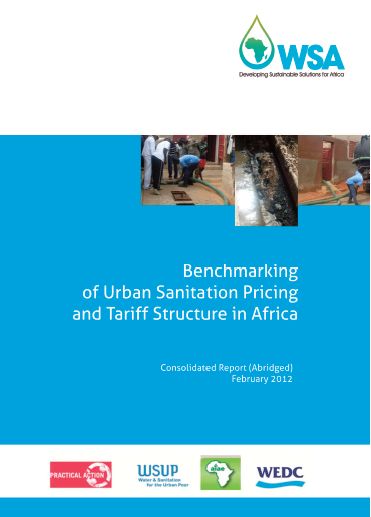
Published in: 2012
Publisher:
Water and Sanitation for Africa, Ouagadougou, Burkina Faso
Author:
WSA
Uploaded by:
SuSanA secretariat
Partner profile:
common upload
7391 Views
301 Downloads
Location of library entry
Content - Summary
The study was conducted in Burkina Faso, Cameroon, Ghana, Kenya, Mozambique and Senegal to explore how changes in the tariff system could increase access to improved sanitation and how tariffs could be used as a vehicle to deliver affordable and sustainable services. In each of the countries, the study was divided into an inception phase, scoping study, methodology workshop, in-depth fieldwork, and validation workshops.
The study found that households pay sanitation tariffs in many forms; payments for using public toilets, connection charges for sewerage; regular payments for the use of sewerage; payments for pit emptying and payments in other forms, including non-financial transactions in some cases. Tariffs are charged by a variety of service providers, including water utilities, local government, small enterprises, NGOs and informal sector service providers. Overall there are some positive practices in sanitation tariffs, but there is no existing single business model, which guarantees the potential of tariffs in providing affordable and sustainable services to the entire city, including low-income populations. It is suggested that a number of changes are required in policy and practice to promote new ways of working to achieve a vision of improved sanitation coverage, especially through tariff regulation and standardization of technologies.
Bibliographic information
WSA (2012). Benchmarking of Urban Sanitation Pricing and Tariffs Structure in Africa. Water and Sanitation for Africa, Ouagadougou, Burkina Faso
Filter tags
English Faecal sludge treatment processes Sub-Saharan Africa Urban (entire city)















